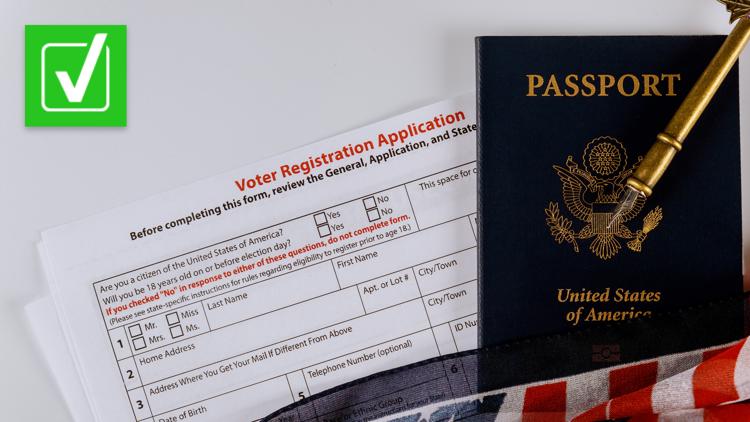The SAVE Act, which hasn’t been passed, could make it harder for married women and others who have changed names to register to vote, like posts online claim.


On Sept. 25, the House passed a temporary budget bill on a 341-82 vote to keep the federal government funded through Dec. 20. The bill would keep the government funded at current levels. Previous budget proposals included provisions of the SAVE Act, but those were cut from the final version that passed the House.
Former President Donald Trump previously urged Republicans to shut down the government if they can’t get any election security provisions into a funding bill.
People across multiple social media platforms have claimed the SAVE Act could make it more difficult or even impossible for some married women to register to vote if they’ve changed their last names and haven’t updated their forms of identification.
A number of readers, including Barb and Karin, asked us if that’s true.
THE QUESTION
Could the SAVE Act make it more difficult for some people who changed their last name to register to vote?
THE SOURCES
THE ANSWER
![]()
Yes, the SAVE Act could make it more difficult for some people who have changed their last name to register to vote.
WHAT WE FOUND
Rep. Chip Roy (R-Texas) introduced the SAVE Act in the House in May. Its provisions were originally included in the House Republican budget bill, although those provisions were dropped on Sep. 22 after that version of the funding bill failed to pass the House.
The bill would have required a prospective voter to prove their citizenship with documentation when they register. Currently, voters are only required to attest to their citizenship under penalty of perjury when they register to vote.
If the SAVE Act were law, a person would be able to prove their citizenship with a REAL ID, a passport, a military ID with a military service record or a government photo ID showing their place of birth. Alternatively, a person could prove their citizenship by submitting another government ID, like a non-REAL ID driver’s license, in conjunction with a birth certificate, record of birth, adoption decree, naturalization certificate or American Indian Card with the classification “KIC.”
A person who has legally changed their name might be unable to provide some or all of these documents with names that match.
Nearly 80% of married women took their husband’s last name when they got married, according to a 2023 Pew Research survey.
Legally changing a name and updating documents to reflect the name change is a multi-step process that can take time.
Alliant Credit Union says the first step a person should take after a name change is to get a new Social Security card. From there, a person can update their driver’s license and passport.
But a married person who takes their spouse’s last name cannot update the name on their birth certificate as part of this process, according to the National Organization for Women (NOW), which opposes voter ID laws.
So if a married person changes their name with the Social Security administration, then is registering to vote under their married name but doesn’t have an updated REAL ID, passport, military ID or government ID with place of birth information, it’s unlikely they would be able to provide proof of citizenship. In this scenario, even if this person had access to their birth certificate which can be used to prove citizenship, the name on the birth certificate would not match their new name.
A 2006 Brennan Center survey found that 52% of voting-age women with ready access to their U.S. birth certificates don’t have a birth certificate with their current legal name, and 34% of voting-age women with access to proof of citizenship documents don’t have any document currently matching their legal name. The Brennan Center opposes efforts to require voters to prove their citizenship at registration.
The SAVE Act does contain a provision that requires each state to establish a process through which someone registering to vote can submit additional documentation as necessary “in the event of a discrepancy” in the person’s documentary proof of citizenship.
While Roy’s press office says this would direct states to provide “reasonable accommodations” for applicants who have changed their name, the SAVE Act does not define what those accommodations are.
The SAVE Act would also require election officials to offer an alternative method that any person without the necessary documentation could use to prove their citizenship.
A person without the necessary documentation would have to attest to their citizenship under penalty of perjury, similar to what any person registering to vote would have to do now. But the SAVE Act requires the person also submits “other evidence” to election officials to prove that they’re a U.S. citizen.
The Election Assistance Commission and the individual states would determine what “other evidence” a person could use to prove their citizenship.
The VERIFY team works to separate fact from fiction so that you can understand what is true and false. Please consider subscribing to our daily newsletter, text alerts and our YouTube channel. You can also follow us on Snapchat, Instagram, Facebook and TikTok. Learn More »
Follow Us
Want something VERIFIED?
Text: 202-410-8808
.png)









 English (US) ·
English (US) ·